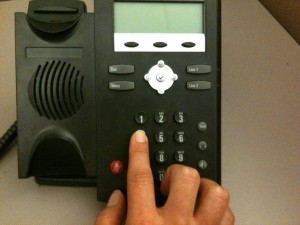Again, there's that "mostly." More on that in a moment.
Fifty calls were made to each of four agencies: the Department of Managed Health Care; the Department of Insurance; the Department of Health Care Services (which oversees Medi-Cal) and at the Managed Risk Medical Insurance Board (which runs the Healthy Families program, among others).
Health Access says this survey was not a scientific sample, but gives a snapshot of successes and challenges. For starters, there are no established standards that these call centers must meet. So Health Access used Medicare and Social Security times for call response and transfer to a live person.
Highlights from the survey include:
- The four agencies averaged 10 seconds to respond to a call
- Average wait time to reach a live person was less than five minutes, although most agencies averaged 2:20 minutes
- As for customer service (knowledge, promptness, accuracy) Health Access evaluators ranked the agencies an average of 3.7 on a scale of 1 to 5, with the best department scoring 4.3
The Department of Managed Health Care (DMHC) had a slightly longer response time -- 15 seconds versus the 10 desired -- but tied for first on overall customer service.
In a statement today, DMHC director Brent Barnhart said, "The DMHC's top priority is to help Californians struggling with their health plan and is honored to be recognized for providing world class customer service. Health Access' report is timely given the fundamental reshaping of our health care delivery system currently underway and provides specific ways each agency can further improve its call centers operations."
The Department of Health Care Services (DHCS) which runs Medi-Cal had total wait times much longer than the other agencies reviewed. Forty-four percent of callers never reached a live person.
Len Finocchio, Associate Director of DHCS, didn't shy away from the challenges. "We take this all very seriously," he said, "as to where we can make improvements, taking in into context all the other work we’re doing in the implementation of the Affordable Care Act."
To improve call center operations, Health Access recommends strategies that sound administrative but are nonetheless important: setting strong standards and tracking whether they are met -- something that doesn't exist now; regular evaluations; and dedication to "world class" customer service.
But then Health Access addresses some more basic challenges. First, even the designers of the survey -- sophisticated internet users who are also intimately familiar with the state health system had trouble just finding the right phone number to call. Health Access recommends prominent placement of the phone number on agency websites. "The world's greatest call center will be of no use if you can't find the phone number," says Linda Leu, co-author of the study.
Health Access also recommends the agencies improve access for people with limited English skills. Communities of color will likely make up a significant percentage of those obtaining insurance via the federal overhaul. Agencies need a "thoughtful and accessible" approach to language access.
"We think this is really important that in order for Californians to get the care and coverage they need, they need to know about their options, they need the help to get the health care they need," says Anthony Wright. "We have a lot of good ingredients in our consumers assistance capacity right now. We think we need to bring it all together to be ready for the crush of calls leading up to 2014."
This post was updated to reflect that the Department of Health Care Services oversees Medi-Cal.
